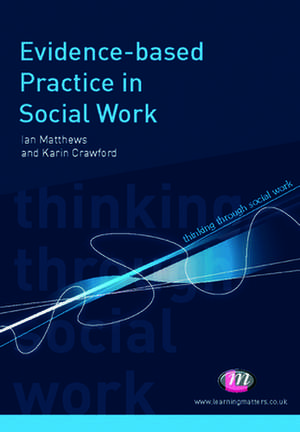Evidence-based Practice in Social Work: Thinking Through Social Work Series
Autor Ian Mathews, Karin Crawforden Limba Engleză Electronic book text – 15 iun 2011
Preț: 185.46 lei
Nou
Puncte Express: 278
Preț estimativ în valută:
31.31€ • 33.48$ • 26.11£
31.31€ • 33.48$ • 26.11£
Indisponibil temporar
Doresc să fiu notificat când acest titlu va fi disponibil:
Se trimite...
Preluare comenzi: 021 569.72.76
Specificații
ISBN-13: 9781844457731
ISBN-10: 1844457737
Pagini: 160
Dimensiuni: 170 x 242 mm
Ediția:1
Editura: SAGE Publications
Colecția Learning Matters
Seria Thinking Through Social Work Series
Locul publicării:London, United Kingdom
ISBN-10: 1844457737
Pagini: 160
Dimensiuni: 170 x 242 mm
Ediția:1
Editura: SAGE Publications
Colecția Learning Matters
Seria Thinking Through Social Work Series
Locul publicării:London, United Kingdom
Cuprins
Introduction
PART ONE
What Underpins Social Work Practice?
Where Does the Knowledge that Influences Practice Come From?
PART TWO
How Does Social Work Engage with Knowledge?
What Influences the Evolution of Social Work Knowledge?
How is Knowledge Produced?
Contemporary Professional Practice and the Changing Use of Knowledge?
Conclusion: Why is it Necessary to Consider the Evidence and Knowledge that Underpins Practice?
Glossary
References
Index
PART ONE
What Underpins Social Work Practice?
Where Does the Knowledge that Influences Practice Come From?
PART TWO
How Does Social Work Engage with Knowledge?
What Influences the Evolution of Social Work Knowledge?
How is Knowledge Produced?
Contemporary Professional Practice and the Changing Use of Knowledge?
Conclusion: Why is it Necessary to Consider the Evidence and Knowledge that Underpins Practice?
Glossary
References
Index
Descriere
At a time when the credibility of social work is again being questioned, this book offers a critical approach to the debate concerning the reliability and validity of the evidence, research and knowledge that underpins professional social work practice. It critiques the notion of ‘evidence’ and argues that ‘knowledge’ is a much broader, more appropriate concept to consider. There is analysis of the different components and sources of this knowledge and an exploration of the often discordant interface between practice and knowledge. Finally, it supports the view that knowledge can be actively developed and tested by a range of people.

